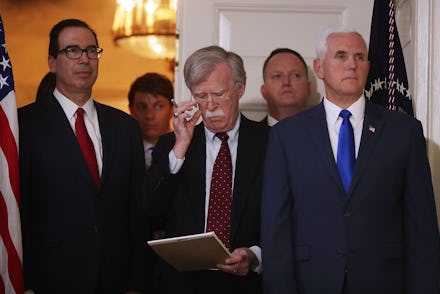Trump’s decision to pull out of the Iran Deal echoes the lead-up to the Iraq War

John Bolton is at it again.
President Donald Trump’s national security adviser, who helped sell the Iraq War on the false premise that Saddam Hussein had weapons of mass destruction, is helping set the United States on what may become a collision course with Iran.
Describing the accord as “disastrous” and accusing Iran of failing to abide by its terms, Trump on Tuesday reneged on the 2015 Iran nuclear deal — also known as the Joint Comprehensive Plan of Action. It was a controversial move, one many observers saw as bearing Bolton’s influence and containing echoes of the lead-up to the 2003 invasion of Iraq.
“I think they are telegraphing to the world that they have not learned the lessons of the Iraq War,” Erica Fein, advocacy director at Win Without War, a progressive national security advocacy program of the Center for International Policy, said in a phone interview Wednesday. “This is a reboot of the first term of the Bush administration.”
Bolton has long been one of the most ardent supporters of the Iraq War. As under-secretary for arms control and international security affairs in George W. Bush’s State Department, he was one of the leading voices claiming that Iraq had weapons of mass destruction. This claim contradicted international inspectors who said Hussein had no such weapons.
No WMDs were ever found in Iraq, and the claim they existed has since been seen as a mere excuse for regime change.
As the Atlantic’s Peter Beinart noted Wednesday, “The parallels between that moment and this one are uncanny.” In both instances, Bolton and Israeli Prime Minister Benjamin Netanyahu were the driving forces behind a campaign to undercut the findings of weapons inspectors.
The International Atomic Energy Agency has repeatedly confirmed that Iran is in compliance with the nuclear agreement. This assessment was backed by Trump’s own State Department as recently as April.
Bolton, however, has long suggested that international verification provisions are “fatally inadequate,” while Netanyahu has claimed to possess secret intelligence proving Iran has been misleading investigators about its nuclear program.
Trump parroted that assertion in withdrawing from the JCPOA on Tuesday, saying in his televised remarks that he has “definitive proof” the “Iranian promise was a lie.”
Bolton has also been a harsh critic of the JCPOA, calling former President Barack Obama’s signature foreign policy achievement an unfixable “diplomatic Waterloo” in a Wall Street Journal op-ed in January. He’s also been far more explicit about his view of Iran than his new boss, who has been criticized for pulling out of the deal without a plan B.
In 2015, Bolton directly called for the bombing of Iran to prevent its regime from acquiring a nuclear weapon, writing in the New York Times that “only military action like Israel’s 1981 attack on Saddam Hussein’s Osirak reactor in Iraq or its 2007 destruction of a Syrian reactor, designed and built by North Korea, can accomplish what is required.”
As in Iraq, Bolton clearly favors regime change in Iran, writing as much in his January op-ed in the WSJ. “America’s declared policy should be ending Iran’s 1979 Islamic Revolution before its 40th anniversary,” he wrote.
Trump and members of his administration have suggested that this is, in fact, their goal in Iran.
“I think it’s very possible that they are building a case for regime change,” Fein said. “They’re not saying they’re going to attack Iran tomorrow, but what they are doing is putting in place the building blocks for escalating it into a conflict.”
It’s unclear what will happen now that Trump has pulled the U.S. out of the accord. The European signatories to the JCPOA have called for “all sides to remain committed to its full implementation,” and Iran has said it will continue to abide by the agreement — though it also warned that it could restart its nuclear program in the coming weeks.
If it does, that would be an “Iraq War-level mistake,” according to Alexandra Bell, a former State Department official during the Obama administration and senior policy director at the Center for Arms Control and Nonproliferation.
“This is just irresponsible and reckless,” Bell said in a phone interview Tuesday. “It’s a deal that’s working and a deal that can be fixed.”